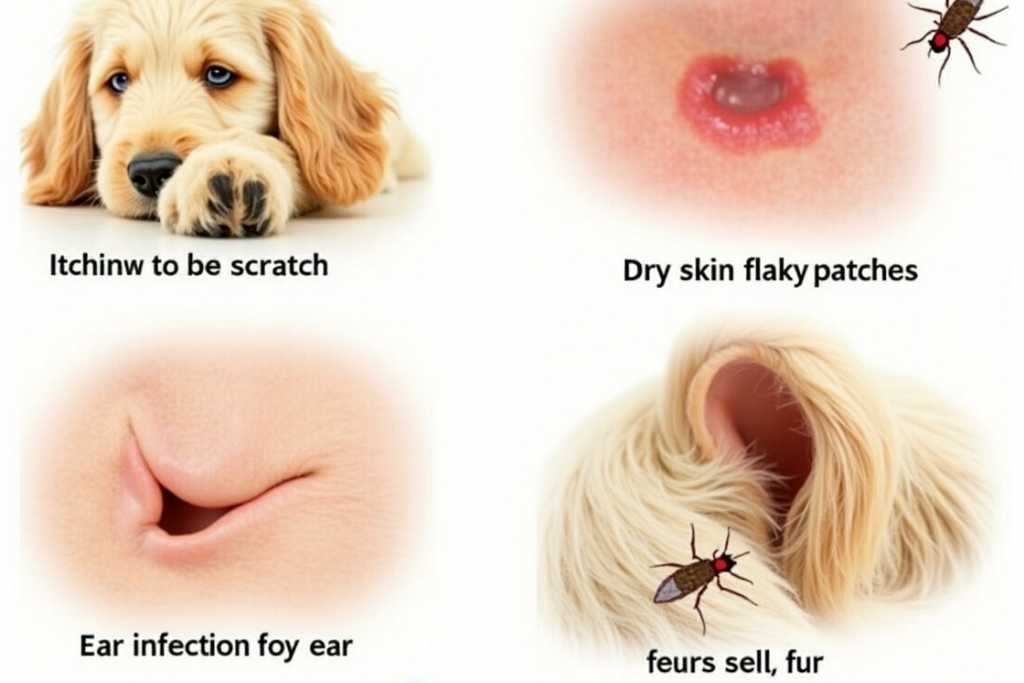Goldendoodles are among the most popular dog breeds for their friendly nature and intelligence. They also offer a rather beneficial hypoallergenic coat, as like other dog breeds, Goldendoodles also show some particular health issues that affect their quality of life.
Are you noticing your Goldendoodle feeling a bit off lately? Goldendoodles are sweet adorable companions, but like all their breeds, they may face certain health-related issues. Being a responsible pet parent, knowing these issues will help you in taking the best possible care of them. Through this article, we will discuss some health complaints that Goldendoodles might encounter and might provide you with some actionable tips for keeping your furry buddy healthy and happy.
Top 10 Common Health Issues of Goldendoodles

1. Hip Dysplasia
Hip dysplasia is an inherited condition that is characterized by improper development of the hip joint, which eventually results in instability and causes arthritis. Goldendoodles are at moderate risk of this condition because of their genetic makeup. The first signs of this condition include difficulty going upstairs, unwillingness to exercise, and a noticeable limp. If untreated, this will result in severe immobility and chronic pain.
Symptoms
- Limping or stiffness
- Difficulty getting up or lying down
- Decreased activity levels
Management and Prevention
- Regular Exercise: Low-impact activities like swimming can strengthen the joints.
- Healthy Weight: Maintain an optimal weight to reduce stress on the hips.
- Veterinary Care: Consult your vet for treatments like anti-inflammatory medications or surgery in severe cases.
2. EYE Issue: Progressive Retinal Atrophy (PRA)
Progressive Retinal Atrophy is an inherited eye condition that leads to gradual vision loss and, eventually, blindness. This degenerative disease affects the retina’s ability to process light, starting with difficulty seeing at night. While PRA is not painful, it significantly impacts a dog’s lifestyle over time.
Symptoms
- Night blindness
- Reluctance to move in low-light conditions
- Cloudy or dull eyes
Management and Prevention
- Regular Eye Checkups: Early diagnosis can help manage symptoms.
- Adapt Your Home: Ensure a safe environment by minimizing obstacles.
- Genetic Testing: Breeders should screen parent dogs for PRA to prevent passing it on.
3. Allergies
Goldendoodles are prone to a variety of allergies, including food allergies, environmental triggers, and contact allergens. These allergies can cause persistent itching, ear infections and digestive problems. Identifying and addressing specific allergens is key to providing relief.
Symptoms
- Itchy skin or paws
- Chronic ear infections
- Vomiting or diarrhea
Management and Prevention
- Dietary Changes: Use hypoallergenic dog food if food allergies are suspected.
- Regular Grooming: Reduces exposure to environmental allergens.
- Veterinary Advice: Allergy testing can pinpoint specific triggers.
4. Hypothyroidism
Hypothyroidism occurs when the thyroid gland produces insufficient hormones, affecting the dog’s metabolism. This is a common endocrine disorder in gout and can lead to weight gain, lethargy and skin problems. Early diagnosis and consistent treatment can help manage the condition effectively.
Symptoms
- Unexplained weight gain
- Thinning coat or dry skin
- Lethargy and intolerance to cold
Management and Prevention
- Medication: Daily thyroid hormone supplements prescribed by a vet.
- Regular Checkups: Ensure hormone levels are monitored periodically.
- Healthy Diet: Support thyroid health with balanced nutrition.
5. Luxating Patella
Luxating patella, or knee dislocation, is a condition where the kneecap slips out of its normal position. This can cause pain and difficulty walking. Small goldendoodles are more susceptible to this condition due to their size and genetic predisposition.
Symptoms
- Skipping or hopping while walking
- Sudden lameness
- Difficulty straightening the leg
Management and Prevention
- Weight Management: Reduces stress on the joints.
- Exercise: Strengthen muscles around the knee with gentle activities.
- Surgical Intervention: In severe cases, surgery may be required to correct the issue.
6. Epilepsy
Epilepsy in Goldendoodles is characterized by recurrent seizures caused by abnormal brain activity. It can range from mild to severe and may occur randomly or due to triggers like stress or flashing lights. Although epilepsy can’t be cured, it can be managed effectively.
Symptoms
- Recurrent seizures
- Loss of consciousness
- Muscle twitching or stiffness
Management and Prevention
- Medication: Anti-seizure drugs prescribed by a vet.
- Stress Management: Maintain a calm environment to reduce triggers.
- Regular Monitoring: Keep a seizure diary to identify patterns.
7. Obesity
Obesity is a common issue among Goldendoodles, which occur mostly due to overfeeding and insufficient exercise. Excess body weight causes several other health concerns, such as joint problems, heart disease, and diabetes. Prevention is easier as compared to treatment; therefore, instilling healthy habits at an early age is important.
Symptoms
- Difficulty breathing
- Reduced stamina
- Visible weight gain
Management and Prevention
- Portion Control: Follow feeding guidelines specific to your dog’s age and size.
- Exercise Routine: Regular walks and playtime to burn calories.
- Regular Weigh-Ins: Monitor your dog’s weight to catch issues early.
Stomach and Digestion Issues
Goldendoodles can sometimes experience stomach and digestion problems, such as bloating, diarrhea, or vomiting. These issues may arise due to dietary changes, food intolerances, or more severe conditions like gastric dilatation-volvulus (GDV), which is life-threatening.
Symptoms
- Bloating or abdominal swelling
- Frequent vomiting or diarrhea
- Loss of appetite or lethargy
Management and Prevention
- Consistent Diet: Feed your Goldendoodle a high-quality and balanced diet.
- Portion Control: Avoid overfeeding and monitor their eating habits.
- Veterinary Care: Consult a vet if symptoms persist or worsen.
- Avoid Risk Factors: Prevent access to foods that may cause intolerance or toxicity.
9. Cataracts
Cataracts in Goldendoodles result in cloudy lenses that impair vision and can lead to blindness. While aging is a common cause, it can also be hereditary. Early intervention can help slow the progression and improve your dog’s quality of life.
Symptoms
- Cloudy or milky appearance in the eyes
- Difficulty navigating
- Reluctance to move in unfamiliar areas
Management and Prevention
- Surgery: Cataract removal can restore vision in many cases.
- Eye Exams: Regular checkups to monitor eye health.
- Healthy Diet: Antioxidants support eye health.
10. Skin Issues: Sebaceous Adenitis and Dry Skin
It is a rare condition, although serious in nature, prone to Goldendoodles: Sebaceous adenitis. It affects the sebum glands, responsible for maintaining oil balance in skin and fur condition. When it balances these glands, it results in dry and scaly skin. Over time, the hair may become thinner, and the dog will suffer itching or irritation. Early diagnosis and treatment will be important for this condition, but it will not be easy.
Symptoms
- Scaly skin and dandruff-like flakes
- Patchy hair loss
- Unpleasant odor
Management and Prevention
- Medicated Shampoos: Designed for sensitive skin.
- Dietary Support: Omega-3 fatty acids promote healthy skin and coat.
- Regular Grooming: Helps prevent secondary infections.
Conclusion
Goldendoodles are wonderful companions, but they require attentive care to address their unique health needs. By staying informed about common health issues and working closely with your veterinarian, you can ensure your furry friend lives a long and happy life. If you suspect any of these conditions in your Goldendoodle, don’t hesitate to seek professional advice. Remember, a healthy dog is a happy dog!
Have questions or need more tips? Leave a comment below or consult your vet to learn more about caring for your Goldendoodle.




